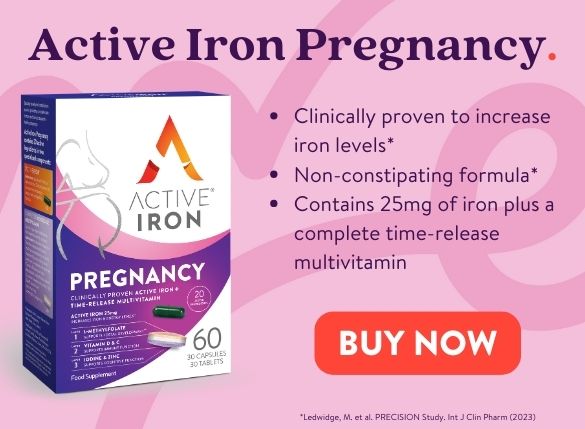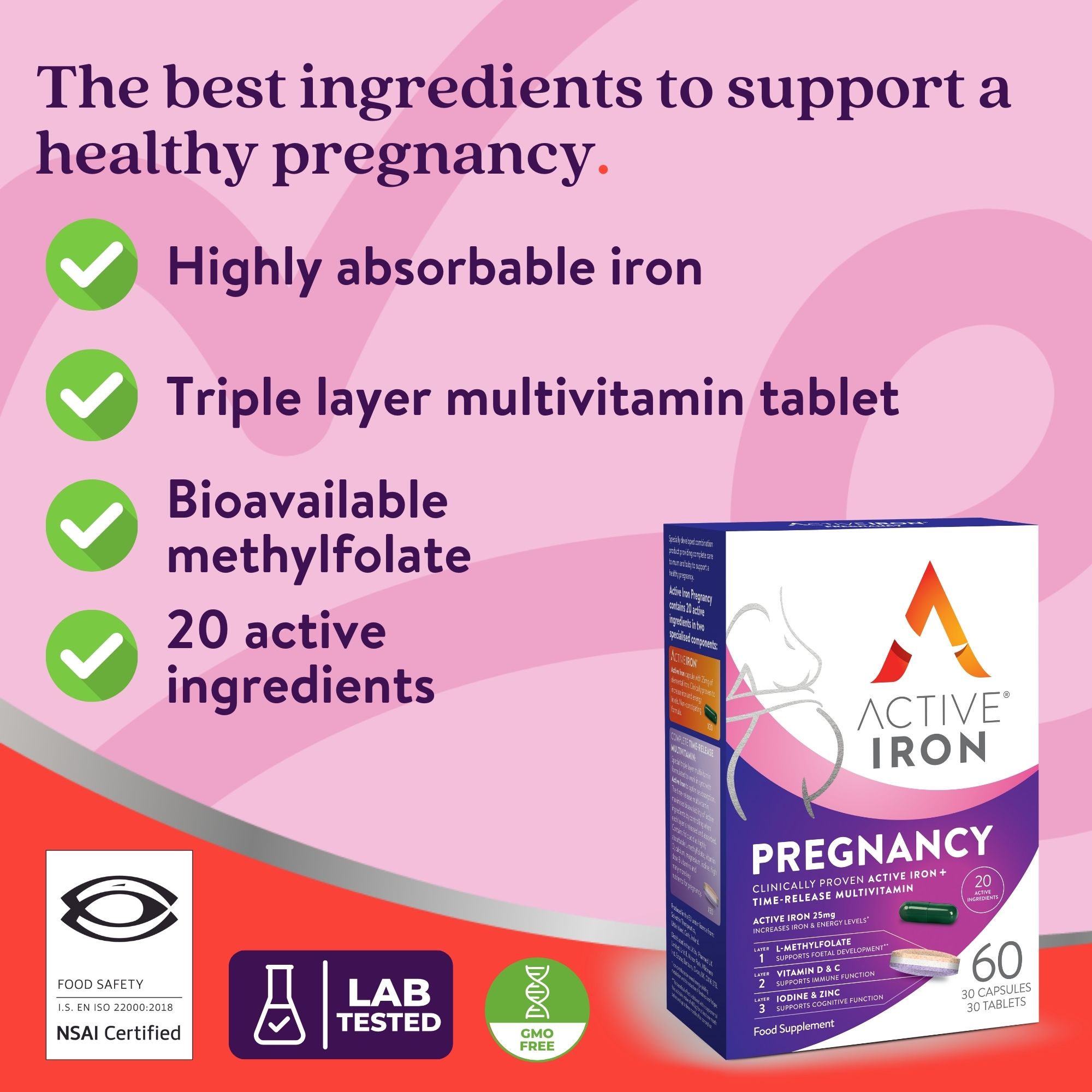Get the right iron dose during pregnancy
During pregnancy, a woman’s body creates extra blood to support her baby’s growth. The extra blood means that women will need more iron in their daily diet. It is estimated that 40% of pregnant women are not getting enough of this important mineral.
To help you understand the importance of your iron dose during pregnancy, this guide will cover:
• When to start taking iron during pregnancy
• The benefits of iron for your baby
• Iron dosage during pregnancy
• Safe sources of iron from food during pregnancy
When to start taking iron during pregnancy
Certain women have an increased risk of developing inadequate iron levels during pregnancy. This includes women who have:
– Had a pregnancy in the last 18 months
– A restricted diet (e.g. vegetarian)
– Any gut issue which might inhibit iron absorption e.g Crohn’s disease
– A history of heavy periods
– A history of inadequate iron levels
The problem is many women may have inadequate iron or reduced iron reserves but may not show any symptoms. If you are planning a pregnancy it is a really good idea to get your bloods and particularly your ferritin (iron stores) checked and to take an iron supplement pre-conception.
When you find out you are pregnant taking an iron supplement the first trimester is a good time to start. The moment conception happens your body begins to make new blood cells to support you and your pregnancy, so your need for iron dramatically increases and this continues to increase through your second & third trimester and during the postpartum period.

What are the benefits of iron for your baby?
Taking the right amount of iron in pregnancy firstly means your baby is unlikely to suffer from inadequate iron at birth and their new immune system may be stronger. That is why it is so important to ensure you are taking enough iron in your diet from before you conceive.
Iron dose during pregnancy
Because your blood volume doubles in pregnancy, your need for iron increases dramatically. You need to be getting about 30mg of elemental iron in your diet or through supplements to support healthy growth and development in pregnancy.
Safe sources of iron from food during pregnancy
There are two types of iron in food heme iron and non-heme iron. Heme iron comes from animal sources and non-heme from plant-based sources. Heme iron is a form that the body finds easier to absorb. Non heme iron is harder for the body to break down
Heme sources of iron: (about 40%, on average will absorbed)
• Beef 2.2 mg/90g
• Lamb 1.6mg/90g
• Chicken 1.2mg/90g
• Turkey 1mg/90g
• Pork 0.8mg/90g
• Ham 1.3mg/90g
• Veal 0.9mg/90g
• Fish (Salmon) 0.4/90g
• Eggs 1.5mg/90g
Non heme Sources of iron: (about 15% on average will be absorbed)
• Tofu 2mg/90g
• Green leafy vegetables(Spinach{cooked}, broccoli, chard, kale, cabbage) Avg 0.4mg/90g uncooked to 1mg/90g cooked
• Potatoes (skin on) 0.3mg/90g
• Sweet potatoes 0.5mg/90g
• Legumes (lentils, soy beans, green beans, black eyes peas) up to 3mg/90g
• Beans (chickpeas, kidney beans, white beans) 2-3mg/90g
• Fortified cereals (see individual packet)
• Fortified rice and pasta (see individual packet)
• Canned or stewed tomatoes 1.2mg/90g
• Beets 0.7mg/90g
• Dried apricots or peaches 2mg/90g
• Dried Figs 2mg/90g
• Raisins1.7mg/90g
• Pumpkin seeds 1mg/30g
• Pistachio nuts 2mg/30g
• Cashew nuts 2mg/30g
• Oats (Porridge) 5mg/90mg
• Branflakes 7mg/90g
What iron supplements are available for pregnancy?
Not all iron supplements are created equally. While some supplements might appear to have more elemental iron content, only a small percentage of this iron (10-15%) is absorbed. Also, the iron that is absorbed is broken down too high up in the gut which may further impact absorption. This also means that they can cause side effects like constipation and gastrointestinal discomfort.
Active Iron Pregnancy has 25mg of elemental iron, all of which is available for absorption because of its unique formulation. Its kind and strong formula is clinically proven to increase iron levels by 94%, while still being gentle enough to take on an empty stomach, and helping to increase iron levels and decrease tiredness and fatigue.

References
- Chatterjee R, Shand A, Nassar N, Walls M, Khambalia AZ. Iron supplement use in pregnancy – Are the right women taking the right amount? Clin Nutr. 2016 Jun;35(3):741-7. doi: 10.1016/j.clnu.2015.05.014.
- Flynn, A. Changes in the management of Iron in Pregnancy. The British Journal of Midwifery,2020 28:9, 636-638. https://doi.org/10.12968/bjom.2020.28.9.636
- Friedrisch JR, Friedrisch BK. Prophylactic Iron Supplementation in Pregnancy: A Controversial Issue. Biochem Insights. 2017 Oct 27;10:1178626417737738. doi: 10.1177/1178626417737738. PMID: 29123406; PMCID: PMC5661664.
- Peña-Rosas JP, De-Regil LM, Garcia-Casal MN, Dowswell T. Daily oral iron supplementation during pregnancy. Cochrane Database Syst Rev. 2015 Jul 22;(7):CD004736. doi: 10.1002/14651858.CD004736.pub5.
- Shinar, S., Skornick-Rapaport, A. & Maslovitz, S. Iron supplementation in singleton pregnancy: Is there a benefit to doubling the dose of elemental iron in iron-deficient pregnant women? a randomized controlled trial. J Perinatol 37, 782–786 (2017). https://doi.org/10.1038/jp.2017.43





